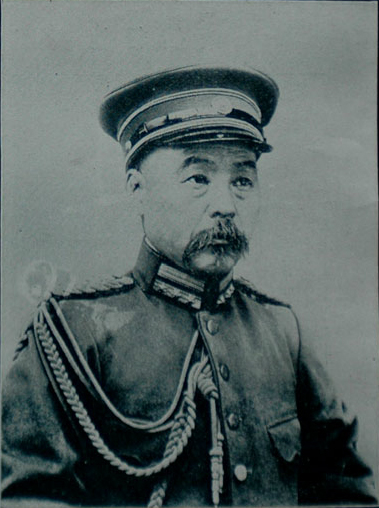|
Yinchang
Yin Chang or In-ch'ang (; 1859 –1928 or 1934) was a military official, ambassador to Germany, and educational reformer in the Qing Dynasty and the Republic of China. He was appointed the nation's first Minister of War in the late Qing Dynasty. During the Republic he served as the military Chief of Staff for all of the subsequent presidents in the Beiyang Government. He was ethnic Manchu, and his family belonged to the Plain White Banner Clan of the Manchu Military Organization (滿洲正白旗); he held the title of Prince of the Plain White Banner Clan; at court he was addressed as Wu-lou (五/午楼). Biography In the Qing Dynasty Originally Yin Chang was a student of the Guozijian, and by 1872 he was studying German at the Tongwen Guan, Beijing. In 1877 he was sent to Germany as an attaché to the recently established Chinese Embassy in Berlin which had offices in Vienna and Amsterdam. On his arrival in Berlin he was not fluent with spoken German and changed fro ... [...More Info...] [...Related Items...] OR: [Wikipedia] [Google] [Baidu] |
Beiyang Army
The Beiyang Army (), named after the Beiyang region,Hong Zhang (2019)"Yuan Shikai and the Significance of his Troop Training at Xiaozhan, Tianjin, 1895–1899" ''The Chinese Historical Review'' 26(1) was a large, Western-style Imperial Chinese Army established by the Qing dynasty government in the late 19th century. It was the centerpiece of a general reconstruction of Qing China's military system. The Beiyang Army played a major role in Chinese politics for at least three decades and arguably right up to 1949. It made the Xinhai Revolution of 1911 possible, and, by dividing into warlord factions known as the Beiyang Clique (), ushered in a Warlord Era, period of regional division. The Beiyang Army had its origins in the New Army, Newly Created Army established in late 1895 under Yuan Shikai's command, which rapidly expanded after 1901 with new recruits and by incorporating other forces. By 1906 it had six divisions and was the most advanced army under the command of the Qing dyna ... [...More Info...] [...Related Items...] OR: [Wikipedia] [Google] [Baidu] |
Wang Shizhen (Beiyang Government)
Wang Shizhen (; 1861–1930), courtesy name Pinqing (聘卿), was a Chinese general and politician of the Republic of China. Biography Wang was born in Zhengding, Zhili in 1861. He was the Minister of War in the Qing Dynasty under Yuan Shikai and in the Republic of China Taiwan, officially the Republic of China (ROC), is a country in East Asia, at the junction of the East and South China Seas in the northwestern Pacific Ocean, with the People's Republic of China (PRC) to the northwest, Japan to the northeas ... three times, 1915–1916 and twice in 1917. He was the Premier of China from 1917 to 1918. External links 1861 births 1930 deaths Republic of China Army generals Premiers of the Republic of China Republic of China politicians from Hebei Politicians from Shijiazhuang Generals from Hebei Viceroys of Huguang People from Zhengding County {{China-mil-bio-stub ... [...More Info...] [...Related Items...] OR: [Wikipedia] [Google] [Baidu] |
Plain White Banner
The Plain White Banner () was one of the Eight Banners of Manchu military and society during the Later Jin and Qing dynasty of China. It was one of the three "upper" banners (Plain Yellow Banner, Bordered Yellow Banner, and Plain White Banner) directly controlled by the emperor, as opposed to the other five "lower" banners. The ''Hoise Niru'' was a military unit associated with the Plain White Banner. Notable Members * Dorgon * Dodo * Duanfang * John Kuan * Ronglu * Yinchang * Nergingge * Empress Xiaoshurui * Youlan (Gūwalgiya) * Consort Donggo * Consort Dun * Minggatu (Mongol) * Imperial Noble Consort Chunhui (Han) * ( a descendant of Yuan Chonghuan) (Han) Notable clans * Donggo * Feimo * Hitara * Gūwalgiya * Tohoro * Su * Cao * Hu'erlate * Yehe Nara Nara (Manchu: , Wade-Giles: nara hala, Chinese: , or ) is a clan name shared by a number of royal Manchu clans. The four tribes of the Hūlun confederation () – Hada (), Ula (), Hoifa () and Yehe () – were ... [...More Info...] [...Related Items...] OR: [Wikipedia] [Google] [Baidu] |
Manchu People
The Manchus (; ) are a Tungusic East Asian ethnic group native to Manchuria in Northeast Asia. They are an officially recognized ethnic minority in China and the people from whom Manchuria derives its name. The Later Jin (1616–1636) and Qing (1636–1912) dynasties of China were established and ruled by the Manchus, who are descended from the Jurchen people who earlier established the Jin dynasty (1115–1234) in northern China. Manchus form the largest branch of the Tungusic peoples and are distributed throughout China, forming the fourth largest ethnic group in the country. They can be found in 31 Chinese provincial regions. Among them, Liaoning has the largest population and Hebei, Heilongjiang, Jilin, Inner Mongolia and Beijing have over 100,000 Manchu residents. About half of the population live in Liaoning and one-fifth in Hebei. There are a number of Manchu autonomous counties in China, such as Xinbin, Xiuyan, Qinglong, Fengning, Yitong, Qingyuan, Weicha ... [...More Info...] [...Related Items...] OR: [Wikipedia] [Google] [Baidu] |
Order Of The Double Dragon
The Imperial Order of the Double Dragon () was an order awarded in the late Qing dynasty. The Order was founded by the Guangxu Emperor on 7 February 1882 as an award for outstanding services to the throne and the Qing court. Originally it was awarded only to foreigners but was extended to Chinese subjects from 1908. It was the first Western-style Chinese order, established in the wake of the Second Opium War as part of efforts to engage with the West and adopt Western-style diplomatic practices. Traditionally the Chinese court did not have an honours system in the Western sense; however hat buttons, rank badges, feathers and plumes were routinely awarded by the Emperor to subjects and foreigners alike prior to and after the introduction of the Order of the Double Dragon. The order was replaced in 1911 during the last days of the Qing dynasty by the Order of the Imperial Throne, although this replacement was never fully implemented and the Republic of China discontinued the imperi ... [...More Info...] [...Related Items...] OR: [Wikipedia] [Google] [Baidu] |
Tongwen Guan
The School of Combined Learning, or the Tongwen Guan () was a government school for teaching Western languages (and later scientific subjects), founded at Peking (Beijing), China in 1862 during the late-Qing dynasty, right after the conclusion of the Second Opium War, as part of the Self-Strengthening Movement. Its establishment was intimately linked to the establishment of the Zongli Yamen, the Qing office of foreign affairs. Background Small, specialized government foreign language schools have long existed in China since the Ming dynasty. As early as 1407, China had an Office for the Languages of Nations of Four Directions (四夷舘/四夷馆 sì yí guǎn), for the purposes of translating documents from minority and nomadic groups including the Mongols, Jurchens, Hui, and Burmese, who delivered tribute to the court. This office was under the Hanlin Academy, and selected students from the Guozijian. These students were made translation officials after graduating, and were ... [...More Info...] [...Related Items...] OR: [Wikipedia] [Google] [Baidu] |
Krupp
The Krupp family (see pronunciation), a prominent 400-year-old German dynasty from Essen, is notable for its production of steel, artillery, ammunition and other armaments. The family business, known as Friedrich Krupp AG (Friedrich Krupp AG Hoesch-Krupp after acquiring Hoesch AG in 1991 and lasting until 1999), was the largest company in Europe at the beginning of the 20th century, and was the premier weapons manufacturer for Germany in both world wars. Starting from the Thirty Years' War until the end of the Second World War, it produced battleships, U-boats, tanks, howitzers, guns, utilities, and hundreds of other commodities. The dynasty began in 1587 when trader Arndt Krupp moved to Essen and joined the merchants' guild. He bought and sold real estate, and became one of the city's richest men. His descendants produced small guns during the Thirty Years' War and eventually acquired fulling mills, coal mines and an iron forge. During the Napoleonic Wars, Friedri ... [...More Info...] [...Related Items...] OR: [Wikipedia] [Google] [Baidu] |
Feng Guozhang
Feng Guozhang, (; courtesy: Huafu 華甫 or 華符) (January 7, 1859 – December 12, 1919) was a Chinese general and politician in early republican China. He held the office of Vice-President and then President of the Republic of China. He is considered the founder of the Zhili Clique of Warlords that vied for control of northern China during the chaotic Warlord era. Early life Feng Guozhang was born to a real estate family in Hejian, Hebei (Zhili). His family had fallen on hard times and was forced to sell its properties to educate its sons; however being the fourth son, Feng was unable to complete his education due to costs. He reputedly had to survive part of his early life by playing the violin in theatres.Gray, p. 169. Early career Without much recourse, Feng enlisted in the army, then undergoing reforms that would eventually create the Beiyang Army under the command of Yuan Shikai. Feng performed admirably and came to the notice of a battalion commander, who referred ... [...More Info...] [...Related Items...] OR: [Wikipedia] [Google] [Baidu] |
Prince Henry Of Prussia (1862–1929)
en, Albert William Henry , image = Prince Henry of Prussia (1862–1929), brother of Kaiser Wilhelm II.jpg , caption = , birth_date= , birth_place= Berlin, Kingdom of Prussia , spouse = , house = Hohenzollern , father = Frederick III, German Emperor , mother = Victoria, Princess Royal , issue = Prince Waldemar Prince Sigismund Prince Henry , death_date = , death_place = Schloss Hemmelmark, Barkelsby, Schleswig-Holstein, Weimar Republic , burial_date = 24 April 1929 , burial_place = Schloss Hemmelmark, Barkelsby, Schleswig-Holstein, Germany , module = Prince Albert William Henry of Prussia (german: Albert Wilhelm Heinrich; 14 August 1862 – 20 April 1929) was a younger brother of German Emperor William II and a Prince of Prussia. He was also a grandson of Queen Victoria. A career naval officer, he held various commands in the Imperial German Navy and eventually rose to the rank of Grand Admiral and Ge ... [...More Info...] [...Related Items...] OR: [Wikipedia] [Google] [Baidu] |
Shandong
Shandong ( , ; ; Chinese postal romanization, alternately romanized as Shantung) is a coastal Provinces of China, province of the China, People's Republic of China and is part of the East China region. Shandong has played a major role in History of China, Chinese history since the beginning of Chinese civilization along the lower reaches of the Yellow River. It has served as a pivotal cultural and religious center for Taoism, Chinese Buddhism and Confucianism. Shandong's Mount Tai is the most revered mountain of Taoism and a site with one of the longest histories of continuous religious worship in the world. The Buddhist temples in the mountains to the south of the provincial capital of Jinan were once among the foremost Buddhist sites in China. The city of Qufu is the birthplace of Confucius and was later established as the center of Confucianism. Confucianism developed from what was later called the Hundred Schools of Thought from the teachings of the Chinese philosopher Con ... [...More Info...] [...Related Items...] OR: [Wikipedia] [Google] [Baidu] |







